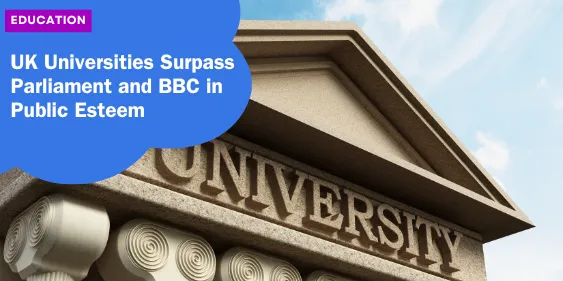UK Universities Surpass Parliament and BBC in Public Esteem
Por: Maria Eduarda em September 12, 2024

Recent survey results from King’s College London have unveiled a surprising shift in public perception, revealing that UK universities now enjoy higher regard than traditional institutions such as Parliament and the BBC.
This development provides a fresh perspective on how the public values different sectors and their contributions to society.
Public Perception: A New Hierarchy of Trust
The survey, which queried 2,600 participants in May, places UK universities in an unexpectedly high position of esteem, ranking just behind the NHS, the armed forces, and the royal family.
This notable endorsement of universities signifies their significant role in British society, despite the sector facing ongoing scrutiny and challenges.
1. Universities’ Elevated Status
Universities have emerged as highly respected institutions, reflecting the public’s acknowledgment of their vital role in advancing knowledge and research. Professor Bobby Duffy, from King’s College London’s policy institute, emphasized the surprising level of admiration for universities. They were rated higher than other institutions, including the civil service, newspapers, and even Parliament, suggesting a broad-based respect for higher education.
2. Political and Public Sentiments
This positive perception of universities is not confined to a specific political group; both Labour and Conservative supporters exhibit similar levels of respect for higher education. This cross-political admiration highlights a widespread recognition of the value that universities bring to society.
Shifts in Funding Attitudes
While universities are highly regarded, a significant shift has occurred in public attitudes towards their funding.
1. Historical vs. Current Views
In 1988, a substantial 68% of respondents believed that universities should receive primary funding from the state. Today, this figure has dropped dramatically to just 19%. This change reflects evolving views on education finance and the increasing role of private funding in higher education.
2. Current Financial Pressures
Despite their esteemed status, universities are navigating substantial financial challenges. Government policies, such as the freeze on domestic tuition fees since 2016 and restrictions on international student visas, have strained university budgets. These financial pressures are compounded by calls from figures like Chancellor Rishi Sunak to eliminate what he describes as “rip-off” degrees and redirect students towards vocational training.
Public Perception of Higher Education’s Political Relevance
Interestingly, while universities enjoy high public esteem, they are not a major political priority for voters.
1. Low Political Prioritization
Only 13% of survey respondents considered higher education a decisive factor in their voting decisions. This contrasts sharply with the 65% who prioritize the NHS, indicating a clear preference for healthcare over educational issues in political discourse.
2. Emphasis on Research and Innovation
Nonetheless, there is strong public support for the role of universities in research and innovation. A significant 74% of respondents view university research as crucial for advancing medical, technological, and social innovations. This high level of support underscores the public’s recognition of universities as key drivers of progress and societal advancement.
3. Focus Areas for University Research
The survey also highlights public preferences for research focus areas. A large portion of respondents (62%) prioritize advancements in healthcare and medicine, while 58% emphasize research addressing environmental challenges. These preferences suggest a public desire for universities to concentrate on research with tangible societal benefits.
Economic Impact of Universities
The economic contributions of universities are also notable. Research from the Higher Education Policy Institute (Hepi) reveals that many parliamentary constituencies gain substantial economic benefits from hosting international students.
1. Economic Benefits to Constituencies
Constituencies such as Sheffield Central and Leeds Central experience significant economic contributions, exceeding £500 million annually from international students. This highlights the critical role of universities in local economies and the broader economic impact of higher education.
2. Regional Disparities
Conversely, constituencies like North Yorkshire, represented by Chancellor Rishi Sunak, see comparatively less economic stimulus from international students. This regional disparity underscores the uneven economic impact of higher education across different areas.
Conclusion: Universities as Cornerstones of Society
In summary, the survey illustrates a nuanced view of UK universities’ public standing.
Despite facing financial constraints and political challenges, universities continue to be highly esteemed for their contributions to research, innovation, and education.
1. Navigating the Evolving Landscape
Understanding these dynamics is crucial for shaping policies that support the sustainability and growth of the higher education sector. As the landscape of higher education evolves, universities must navigate both public expectations and financial pressures effectively.
2. Policy and Strategic Considerations
By delving into these insights, policymakers and university leaders can better align initiatives with societal needs and educational aspirations. This understanding will help in maintaining public trust and ensuring that universities continue to play a pivotal role in advancing knowledge and addressing global challenges.
In conclusion, UK universities’ elevated status reflects a broad-based respect for their contributions, despite the challenges they face. As the sector continues to evolve, ongoing engagement with public sentiment and strategic adaptation will be essential for sustaining their esteemed position in society.






